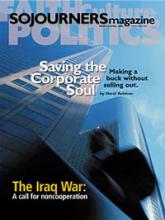Philip Berrigan, 79, the first American Catholic priest jailed for political dissent, according to one biographer, died on December 6, 2002, in Baltimore, Maryland. He had dedicated his life to living the gospel through nonviolent struggles against racism, the Vietnam War, nuclear weapons, and U.S. militarism.
Raised in a large, working-class family in Minnesota and upstate New York, Berrigan inherited a concern for social justice from his socialist father. During World War II, Philip was drafted and served as an infantryman, an irony that was not lost on him during his long career as a pacifist: "I killed in order to prove the immorality of killing," he said later.
Appalled at the racism he witnessed in the army, Berrigan went on to be ordained in 1955 in the Society of St. Joseph, an order of Catholic priests devoted to serving African Americans. He taught at the all-black St. Augustine's High School in New Orleans until 1963 and became involved in the civil rights movement, participating in marches and freedom rides. Student Nonviolent Coordinating Committee organizer Stokely Carmichael once described Berrigan as "the only white man who knows where it's at." The movement schooled Berrigan in the principles and practice of nonviolence and impelled him to his first arrest, in Selma, Alabama, in the early 1960s.
Soon, Berrigan's commitment to racial justice led him to question the U.S. involvement in Vietnam: "Is it possible for us to be vicious, brutal, immoral, and violent at home and be fair, judicious, beneficent, and idealistic abroad?" Because of his antiwar sentiments, he was transferred in 1965 from a seminary teaching post to a poor African-American parish in Baltimore.
Read the Full Article
